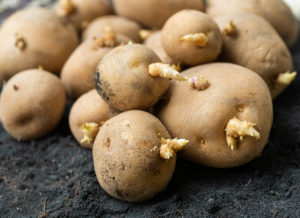 New research confirms that potatoes are not as bad as once thought for people with type 2 diabetes. It has long been thought that high glycemic index (GI) foods, such as potatoes, should be avoided by those with diabetes because of the way they affect blood sugar levels. However, this new information goes against what experts have suggested for decades.
New research confirms that potatoes are not as bad as once thought for people with type 2 diabetes. It has long been thought that high glycemic index (GI) foods, such as potatoes, should be avoided by those with diabetes because of the way they affect blood sugar levels. However, this new information goes against what experts have suggested for decades.
The finding of the study published in Clinical Nutrition shows that when people with type 2 diabetes ate a mixed meal with skinless white potatoes, they had a better ‘nocturnal’ GR, compared to when they consumed a macronutrient-matched mixed meal that included basmati rice, a low GI carbohydrate food. A rise in blood sugar during the night has long been associated with cardiovascular disease and endothelial dysfunction.
Advertisement
Participants consumed the same breakfast and lunch for the study, but they were randomly assigned to one of four dinners. Each meal included either skinless white potatoes (test meal) prepared in three different ways (roasted, boiled, or boiled then cooled and reheated) or basmati rice (control meal). The meals were repeated with a 9-day break in between each trial to cycle through all test meals and the control.
All participants had blood samples collected immediately after the meal and again every 30 minutes for 2 hours. They were also required to wear a continuous glucose monitor overnight to track changes in blood sugar levels while sleeping.
After following a rigorous methodology by using a randomized crossover design and measuring glucose levels both immediately post-meal and overnight to obtain a better picture of the potatoes’ impact on GR, researchers were able to gain a better insight into how potatoes may affect blood sugar levels.
It was concluded that no differences were found in the glucose response between meals or following the dinner that contained the potatoes or basmati rice. Participants’ overnight GR was also more favorable after eating the evening meal that included any of the high GI potato side dishes compared to the low GI basmati rice.
Other Factors to Consider
Dr. Brooke Devlin, PhD, the primary investigator at Australian Catholic University in Melbourne explains, “Despite its frequent use among nutrition researchers, GI is not an appropriate tool for understanding how a meal impacts glycemic control; it is a very specific measurement for foods consumed in isolation, typically conducted under controlled laboratory conditions. It’s rare that people eat foods in isolation, and findings from this study demonstrate how other factors, such as the time of day or food pairings, need to be considered when investigating the GR of mixed meals in individuals with T2D.”
This research helps to better understand the relationship between food choices and type 2 diabetes. It is contrary to that of traditional dietary guidance and observational research which has previously suggested that potatoes are not an appropriate food choice for those with type 2 diabetes. This new information helps people to understand that white potatoes can be consumed as part of a healthy evening meal without negatively affecting GR. Potatoes can deliver key nutrients in relatively few calories, which is essential for people with type 2 diabetes.
